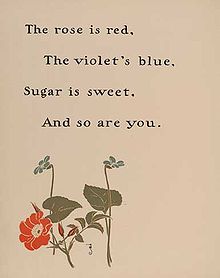Roses Are Red
| "Roses Are Red" | |
|---|---|
 William Wallace Denslow's illustrations for "Roses are red", from a 1901 edition of Mother Goose | |
| Song | |
| Written | England |
"Roses Are Red" can refer to a specific poem, or a class of poems inspired by that poem. It has a Roud Folk Song Index number of 19798.[1] It is most commonly used as a love poem.
Lyrics
The most common modern form of the poem is:
- Roses are red,
- Violets are blue,
- Sugar is sweet,
- And so are you.
Origins
The origins of the poem may be traced at least as far back as to the following lines written in 1590 by Sir Edmund Spenser from his epic The Faerie Queene (Book Three, Canto 6, Stanza 6):[2]
- It was upon a Sommers shynie day,
- When Titan faire his beames did display,
- In a fresh fountaine, farre from all mens vew,
- She bath'd her brest, the boyling heat t'allay;
- She bath'd with roses red, and violets blew,
- And all the sweetest flowres, that in the forrest grew.
A nursery rhyme significantly closer to the modern cliché Valentine's Day poem can be found in Gammer Gurton's Garland, a 1784 collection of English nursery rhymes:
- The rose is red, the violet's blue,
- The honey's sweet, and so are you.
- Thou are my love and I am thine;
- I drew thee to my Valentine:
- The lot was cast and then I drew,
- And Fortune said it shou'd be you.[3]
Victor Hugo was likely familiar with Spenser, but may not have known the English nursery rhyme when, in 1862, he published the novel Les Misérables. Hugo was a poet as well as a novelist, and within the text of the novel are many songs. One sung by the character, Fantine, contains this refrain, in the 1862 English translation:
- We will buy very pretty things
- A-walking through the faubourgs.
- Violets are blue, roses are red,
- Violets are blue, I love my loves.
The last two lines in the original French are:
- Les bleuets sont bleus, les roses sont roses,
- Les bleuets sont bleus, j'aime mes amours.
(Les Misérables, Fantine, Book Seven, Chapter Six)[4]
Folklore
Numerous satirical versions have long circulated in children's lore.[5] Among them:
- Roses are red.
- Violets are blue.
- Onions stink.
- And so do you.[6]
The Marx Brothers' film Horse Feathers has Chico Marx describing the symptoms of cirrhosis thus:-
- Cirrhosis are red,
- so violets are blue,
- so sugar is sweet,
- so so are you.[7]
Benny Hill version:-
- Roses are reddish
- Violets are bluish
- If it weren't for Christmas
- We'd all be Jewish[8]
Notes
- ^ "Roud Folksong Index S299266 Roses are red, violets are blue". Vaughan Williams Memorial Library. English Folk Dance and Song Society. Retrieved May 20, 2016.
- ^ The Faerie Queene, Cant. VI.
- ^ I. Opie and P. Opie, The Oxford Dictionary of Nursery Rhymes (Oxford University Press, 1951, 2nd edn., 1997), p. 375.
- ^ Les misérables, Tome I by Victor Hugo at Project Gutenberg
- ^ S. J. Bronner, American Children’s Folklore (August House: 1988), p. 84.
- ^ "Jill Still Playing Jacks And Hopscotch Endures", retrieved 17 September 2009.
- ^ Horse feathers
- ^ Lawrence Dorfman, Snark! The Herald Angels Sing: Sarcasm, Bitterness and the Holiday Season, Skyhorse Publishing, (2013),
